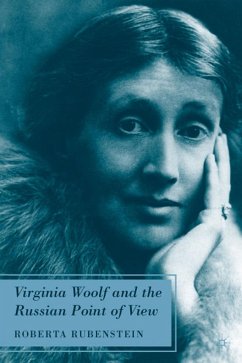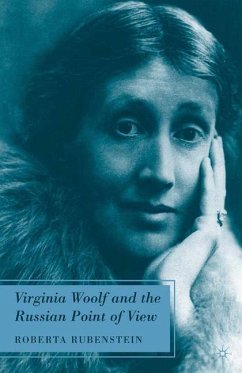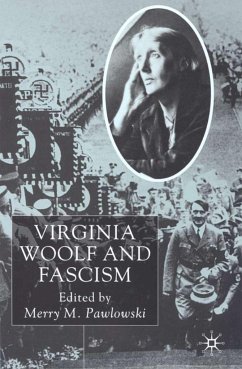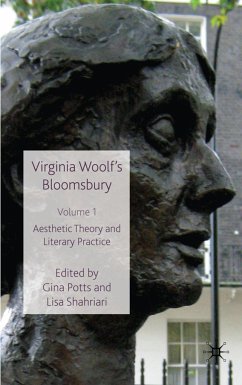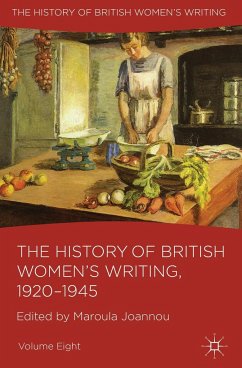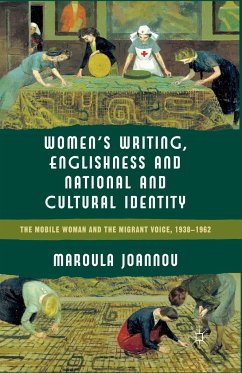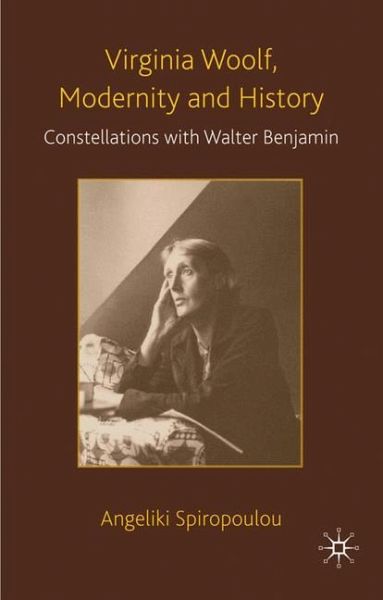
Angeliki Spiropoulou
Gebundenes Buch
Virginia Woolf, Modernity and History
Constellations with Walter Benjamin
Versandkostenfrei!
Versandfertig in 6-10 Tagen

PAYBACK Punkte
19 °P sammeln!





This book analyses the representation of the past and the practice of historiography in the fiction and critical writings of Virginia Woolf, and draws parallels between Woolf's historiographical imagination and the thought of Walter Benjamin, the German philosopher of history and key theorist of modernity.
Angeliki Spiropoulou holds a PhD from the University of Sussex, UK. She is Lecturer in Modern European Literature and Theory at the University of the Peloponnese, Greece. Her recent publications include: Culture Agonistes: Debating Culture, Rereading Texts (co-editor, Bern 2002); Contemporary Greek Fiction: International Orientations and Crossings (co-editor, Athens 2002); Walter Benjamin: Images and Myths of Modernity (editor, Athens 2007) and History of European Literature: 18th-20th C (co-author, Patras 2008).
Produktdetails
- Verlag: Palgrave Macmillan / Palgrave Macmillan UK / Springer Palgrave Macmillan
- Artikelnr. des Verlages: 978-0-230-53758-3
- Seitenzahl: 252
- Erscheinungstermin: 17. März 2010
- Englisch
- Abmessung: 222mm x 145mm x 19mm
- Gewicht: 439g
- ISBN-13: 9780230537583
- ISBN-10: 0230537588
- Artikelnr.: 28954066
Herstellerkennzeichnung
Springer-Verlag GmbH
Tiergartenstr. 17
69121 Heidelberg
ProductSafety@springernature.com
"Spiropoulou's is the most significant full-length study on both Woolf and Benjamin ... She foregrounds the confluences between these two modernist icons, yet also highlights the tensions within their own oeuvres - between, most obviously, modernity and history and the present and the past. ... Spiropoulou's very notion - or figuration - of constellations provides an illuminating means of exploring other relationships among writers." (Jeanne Dubino, Textual Practice, Vol 28 (4), July, 2014)
"This inventive, skilfully constructed study also serves as a site of new potentialities, producing vivid new readings of the author's work ... presenting Spiropoulou as a critic in perfect alignment with her subject." (James Bailey, European
"This inventive, skilfully constructed study also serves as a site of new potentialities, producing vivid new readings of the author's work ... presenting Spiropoulou as a critic in perfect alignment with her subject." (James Bailey, European
Mehr anzeigen
Journal of English Studies, Vol. 15 (1), March, 2011)
"In bringing Virginia Woolf's histriographical techniques into constellation with Benjamin's thoughts on modernity and history, Spiropoulou offers a fresh approach to Woolf's engagement with history which neither ties her work to the "subjective realism" of new historicism, nor neccesarily implicates her as a precursor to postmodern approaches to history." (Routledge ABES)
"Angeliki Spiropoulou's Virginia Woolf, Modernity and History: Constellations with Walter Benjamin is a handy and compact book that can be taken as emblematic of the direction comparative literature is taking today. Spiropoulou shows vividly and cogently that the point is no longer to simply compare texts, periods, or authors, but to find new ways of combining literature and theory. The aim is to read better, deeper, and more intelligently the canonical authors that are too often taught in isolation." (Jean-Michel Rabate, Journal of Modern Literature)
"The book is an important contribution to Woolf studies as well as literary modernist studies and historical studies more generally. It is also a particularly timely book in that the relation between gender,sexuality and temporality, especially history, is currently receiving renewed critical attention." (Jana Funke, Historein)
"Virginia Woolf, Modernity and History suggests a method of inquiry that, indeed, could inspire interesting interdisciplinary approaches among historians, philosophers and literary theorists." (Daniel W. Bang, Woolf Studies Annual)
"In bringing Virginia Woolf's histriographical techniques into constellation with Benjamin's thoughts on modernity and history, Spiropoulou offers a fresh approach to Woolf's engagement with history which neither ties her work to the "subjective realism" of new historicism, nor neccesarily implicates her as a precursor to postmodern approaches to history." (Routledge ABES)
"Angeliki Spiropoulou's Virginia Woolf, Modernity and History: Constellations with Walter Benjamin is a handy and compact book that can be taken as emblematic of the direction comparative literature is taking today. Spiropoulou shows vividly and cogently that the point is no longer to simply compare texts, periods, or authors, but to find new ways of combining literature and theory. The aim is to read better, deeper, and more intelligently the canonical authors that are too often taught in isolation." (Jean-Michel Rabate, Journal of Modern Literature)
"The book is an important contribution to Woolf studies as well as literary modernist studies and historical studies more generally. It is also a particularly timely book in that the relation between gender,sexuality and temporality, especially history, is currently receiving renewed critical attention." (Jana Funke, Historein)
"Virginia Woolf, Modernity and History suggests a method of inquiry that, indeed, could inspire interesting interdisciplinary approaches among historians, philosophers and literary theorists." (Daniel W. Bang, Woolf Studies Annual)
Schließen
Für dieses Produkt wurde noch keine Bewertung abgegeben. Wir würden uns sehr freuen, wenn du die erste Bewertung schreibst!
Eine Bewertung schreiben
Eine Bewertung schreiben
Andere Kunden interessierten sich für






